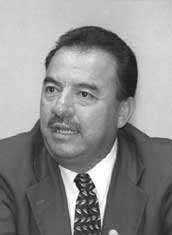Local legislators Abel Maldonado, John Laird split on
controversial vote
South Valley Assemblyman Simón Salinas cast the deciding vote this week on controversial and historic legislation to legalize same-sex marriage, although it appears the victory for gay rights advocates will be fleeting and symbolic.
The law, which Gov. Arnold Schwarzenegger has promised to veto, passed the California Assembly 41-35 Tuesday. No Republicans in the Assembly voted in favor of the bill.
“I figured this was one of those issues where you can’t stand on the sidelines,” said Salinas, who originally planned to abstain from the vote. “I listened to the debate and at the end you’re either against discrimination or you’re not. It’s a tough issue for some, but it was the right thing to do.”
Salinas (D-Salinas) abstained from a June vote in which the bill was defeated. He promised the bill’s author, Assemblyman Mark Leno (D-San Francisco), that he would not let the bill fail this time. Salinas’ district includes Gilroy and southern Santa Clara County, but not Morgan Hill.
The tension during the vote was palpable, according to Salinas, whose decision to cast the 41st and deciding vote inspired raucous applause from gay rights supporters in the Assembly’s gallery.
“It’s something that many don’t want to see happen and others feel strongly about it,” Salinas said. “There is intense debate and it’s very emotional.”
The bill proposes redefining marriage under California law as a “civil contract between two persons,” rather than a “civil contract between a man and a woman.”
Morgan Hill’s assemblyman, John Laird (D – Santa Cruz), a member of the California Legislative Lesbian, Gay, Bisexual and Transgender Caucus, was among the Democrats who voted in favor of the bill. He did not expect the legislation to muster the two-thirds majority needed to override Schwarzenegger’s veto, but he was confident the bill’s time would come – “whether it’s next year, five years, or 10 years.”
In the meantime, he applauded Salinas’ decision to cast a historic but controversial vote.
“In 1964, the voters of California overwhelmingly said you could discriminate in who you sold your house to on the basis of color,” Laird said. “They were wrong, and the courts recognized it, and the legislature recognized it. … There’s a point where you have to decide to lead, and you have to rely on your conscience.”
Locally, Morgan Hill City Councilman Greg Sellers and Steve Tate said they support the legislation.
“I believe everyone should have a choice of who they want to marry,” said Tate.
“The legislation makes sense, in fairness and equity, we ought to be supportive of that. It’s a civil rights issue and an equality issue,” added Sellers.
In Gilroy, Salinas’ vote has been met with mixed reaction – even among his strongest backers.
Gilroy Councilman Charles Morales, a longtime Salinas supporter, said he personally believes marriage should be reserved for a man and woman, but added that he ultimately would have voted the same way as Salinas.
“I have my personal beliefs, but I would not pass judgment on others,” Morales said. “God loves all of us.”
Eleanor Villarreal, a well-known community organizer and fundraiser for Rebekah Children’s Services, expressed relief with Salinas’ decision.
“I saw … that he had thought about abstaining,” Villarreal said, “and as a Democrat and a number one supporter of Salinas I was disappointed. I was glad to see that he did the right thing.”
“I just think it’s long overdue,” she added. “It’s a civil rights issue.”
Prior to arriving in the Assembly, the bill passed 21-15 in the state Senate last week.
Morgan Hill’s state senator, Abel Maldonado (R – Santa Maria), voted against it. Maldonado was unavailable for comment.
Senator Jeff Denham (R-Merced), who will defend his seat in 2006 against Salinas, was also among those who voted against it. Salinas said he’s seen the incumbent engage in hardball politics in the past and predicted that his Tuesday vote would become a hot button issue in the upcoming campaign. Denham’s district includes Gilroy and San Benito County, but not Morgan Hill.
“I’ll explain to people and hope they realize I’ve spent my whole life fighting discrimination,” Salinas said. “I understand the implications of a vote like this. I hope he (Denham) will be civil about discussions. We all have to be able to sleep at night, and I can only control what I’m going to do.”
Denham has said he’s ready for open, honest debate, but was unavailable for comment Wednesday due to a death in the family, according to his aide, Nick Rappley.
Steve Presson, a campaign consultant for Denham, called the senator’s stand against the bill a “vote of conscience.”
“He (Denham) has always been a strong supporter of family values,” Presson said. “He recognizes the people of California have clearly spoken when they supported Prop. 22.” That proposition, passed in 2000, defined marriage as a union between a man and a woman.
Presson said with his vote Salinas was “thumbing his nose at the will of the voters in the 12th Senate district.” A majority of district voters favored Proposition 22, although the boundaries of the district have changed since the measure passed.
Santa Clara County Supervisor Don Gage, who voted against a county resolution in favor of same-sex marriage, said his beliefs would have kept him from supporting the state law. But he acknowledged Salinas’ moral dilemma.
“Some of the time, if you get an overwhelming response from voters, those are the people who elected you and you have to listen to them,” Gage said. “But there are those times you have to take a stand. The risk is that voters will say you’re not representing them and it may cost you an election, but sometimes you have more knowledge than folks do and you have to do what you think is right.”
California already gives same-sex couples many of the rights and duties of marriage if they register with the state as domestic partners. Massachusetts offers marriage licenses to gay couples and Vermont grants civil unions, but both resulted from court rulings rather than legislative action.
The California Legislature will now go into the history books as the first legislative body in the country to pass a bill allowing same-sex marriage, but the victory will likely be short-lived.
A spokesperson for Schwarzenegger announced this week that the Republican governor would veto the legislation. The governor has said courts, not lawmakers, should decide the issue of same-sex marriage. Meanwhile, opponents are busy qualifying ballot initiatives for 2006 that would ban same-sex marriage under the state Constitution.
Staff writers Serdar Tumgoren and Rose Meily contributed to this report.








